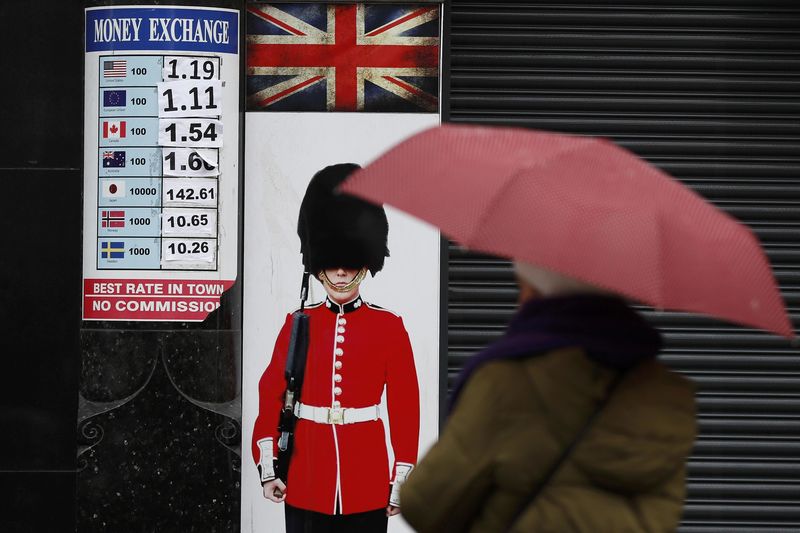By Jemima Kelly
LONDON (Reuters) - Sterling skidded to its lowest levels - bar a "flash crash" in October - in 32 years on Monday, hit by fears that Prime Minister Theresa May will say on Tuesday Britain is set for a "hard" Brexit out of the EU and its single market.
The pound fell as much as 1.5 percent against the dollar and 2.5 percent against the yen. That shifted the spotlight away from the greenback, which has come under pressure in recent days as investors ponder U.S. President-elect Donald Trump's likely economic policies after he takes office on Friday.
The pound plunged to $1.1983
By 1450 GMT (9:05 a.m. ET) sterling had steadied around $1.2075, down around 0.8 percent on the day.
Dealers said the market was reacting to various media reports over the weekend that said May would signal plans for a "hard" Brexit in her speech on Tuesday, saying she is willing to quit the European Union's single market in order to regain control of Britain's borders.
"Every time there's 'hard Brexit' headlines, that triggers a fresh bout of selling sterling," said MUFG currency analyst Lee Hardman, in London.
"It's almost impossible to see Europe allowing the UK to remain a full member of the single market if it wants to regain control of the border and the laws and wants to strike its own agreements."
Hardman and other London-based analysts said the weekend reports did not add much to what was already known - May's government has consistently pointed towards giving priority to immigration controls over keeping preferential single market access. They said that was why sterling had not fallen further in European trading hours.
U.S. markets were closed on Monday for Martin Luther King day, meaning there was generally less action on other major pairs. Reuters data showed sterling volumes topped 200 percent of monthly averages in the European morning before collapsing to just 59 percent by 1400 GMT.
Citi's head of European G10 currency strategy in London, Richard Cochinos, said Britain's hefty current account and budget deficits meant it was heavily dependent on foreign capital. The more uncertainty investors feel over Britain's place in Europe, he said, the more investment dries up.
May has said she will trigger Article 50 - starting the formal EU withdrawal talks - by the end of March. But until now, she has revealed few details about what kind of deal she will seek, frustrating some investors, businesses and lawmakers.
"SAFE-HAVEN" YEN
The euro climbed as much as 1.5 percent against the pound to a two-month high of 88.53 pence (EURGBP=), before retreating to 87.85 pence, still up 0.7 percent on the day.
Against the yen, which is perceived as a safe haven, sterling fell as much as 2.3 percent to a two-month low of 136.48 yen (GBPJPY=), before recovering to trade down around 1.4 percent lower on the day by 1230 GMT.
The Japanese currency gained broadly as a risk-off mood permeated through markets, hitting a six-week high of 113.61 yen to the U.S. dollar
The dollar index was up 0.4 percent (DXY), having racked up its worst performance last week since Trump's election in November, a reflection of the reversal of the market consensus backing the dollar at the end of last year and, some say, concerns over policy.
The new administration is expected to embark on stimulus to boost growth and inflation, prompting the U.S. Federal Reserve to raise interest rates faster. But Trump's protectionist stance has also added to some investors' worries over protectionism and global geopolitical risks.
"The Trump presidency ... has boosted business confidence but unsurprisingly, key data points like employment and retail sales since the election haven't been that exciting," said Societe Generale (PA:SOGN) strategist Kit Juckes.
"Maybe (Trump's) Inauguration gets markets looking forwards again though perhaps more in equities than FX."

For Reuters Live Markets blog on European and UK stock markets see reuters://realtime/verb=Open/url=http://emea1.apps.cp.extranet.thomsonreuters.biz/cms/?pageId=livemarkets